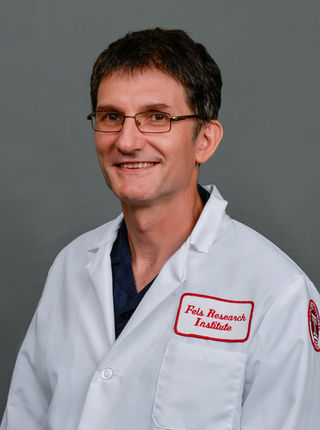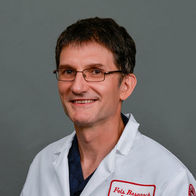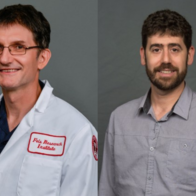Xavier Graña-Amat, PhD
Professor, Cancer and Cellular Biology
Professor, Fels Cancer Institute for Personalized Medicine
Professor, Medical Genetics and Molecular Biochemistry
Professor, Biomedical Education and Data Science

- Contact Information
-
- About Me
-
Research Interests
Cell cycle control in mammalian cells and its deregulation in cancer. Role of cyclins, cyclin dependent kinases (CDKs), Ser/Thr protein phosphatases and tumor suppressor genes.
Research in my laboratory focuses on the molecular mechanisms that govern the cell cycle of normal and malignant eukaryotic cells, with a particular interest in the molecular signaling that controls cell cycle specific gene expression. Our major focus is on the mechanisms that govern cell cycle entry and exit, which operate in the G1 phase of the cell cycle. When higher eukaryotic cells exit the cell cycle they have three different fates, terminal differentiation, senescence or quiescence. While the first two fates are typically irreversible, quiescent cells can reenter the cell cycle when the environment is appropriate. Eukaryotic cells have evolved to respond to a large array of growth promoting and inhibiting signals, which are eventually integrated by a conserved protein engine consisting of distinct cyclin/CDK (Cyclin Dependent Kinase) holoenzymes. CDKs are activated at specific stages of the cell cycle and their activities are required for progression through S phase and mitosis (reviewed by Graña and Reddy, 1995; Graña et al., 1998, Sotillo and Graña, 2010). I am interested in how these regulatory pathways are disrupted in cancer cells as well as in cells transformed by small DNA viruses or infected by HIV (Graña et al., 1998, Garriga and Graña, 2004, Sotillo and Graña, 2010).
One initial focus of this laboratory was the characterization of p130, a protein structurally and functionally related to the product of the retinoblastoma susceptibility tumor suppressor gene (reviewed in Mayol and Graña, 1997; 1998; Graña et al., 1998). We first identified phosphorylation as a major mechanism for regulation of p130 in G1 and G0 (Mayol et al., 1995; Mayol et al., 1996). We, and others, found that p130 is phosphorylated during the cell cycle by the concerted action of D-type cyclin/CDKs and cyclin E/CDK2 holoenzymes (Parreño et al., 2001, Calbo et al., 2002), and determined mechanisms by which the E1A oncogene modulates pocket protein phosphorylation (Parreño et al., 2000 and Parreño et al., 2001). In addition, we and others reported on the relationship between the protein levels and phosphorylation status of pocket proteins (Mayol et al., 1996; Garriga et al., 1998a), eventually showing that p130 protein levels are regulated by the SCFSKP2 ubiquitin ligase (Bhattacharya et al., 2003). Recently, our focus has expanded to studies dealing with the coordinated regulation of the three members of the retinoblastoma family of proteins by CDKs and Ser/Thr phosphatases in response to a variety of signals (Calbo et al., 2002 and Garriga et al., 2004). In our efforts to better understand the G0/G1 transition we have found that certain serum starved tumor cells enter the cell cycle in the absence of mitogens following ectopic expression of G1 cyclins (Calbo et al., 2002). More recently we discovered that in quiescent normal human fibroblast, deregulation of cyclin E is not sufficient to induce cell cycle entry. We have subsequently found that this is due to the inability of cyclin E to activate CDK2 in normal cells. However, this can be bypassed by co-expressing SV-40 small t antigen (st), which cooperates with cyclin E to induce phosphorylation of CDK2 at its activating residue leading to CDK2 activation. Cyclin E and st cooperate to bypass quiescence induced by multiple signals and endow cells with transformed characteristics (Sotillo et al. 2008). We subsequently identified the essential replication factor CDC6 as a target of st, whose expression appears required for activation of CDK2 and cell cycle progression when the cell cycle is driven by the oncogenic expression of st and cyclin E (Sotillo et al. 2009, reviewed in Sotillo and Graña 2010). Moreover, we are also interested in gaining a better understanding as to how Ser/Thr protein phosphatases reverse the action of CDKs during the cell cycle (Garriga et al., 2004), and have recently identified particular PP2A holoenzymes implicated in this process (Jayadeva et al, 2010), reviewed in Kurimchak and Graña (2012).
The other primary area of research in this lab deals with the functional characterization of CDK9 (formerly named, PITALRE), cloned by means of its partial sequence identity to the CDC2 kinase (Graña et al., 1994; Garriga et al., 1996a and Garriga et al., 1996b). Following the identification of CDK9 as a subunit of the Positive Transcription Elongation Factor b (P-TEFb) and HIV tat associated kinase (TAK) by Dr. David Price’s group (University of Iowa), we demonstrated that the levels of cyclin T1, one of the three cyclins that bind to and activate CDK9, is upregulated during T-cell activation. Upregulation of cyclin T1 expression correlates with phosphorylation of RNA polymerase II (RNA pol II) in vivo and HIV-1 replication (Garriga et al., 1998b). Subsequently, we have characterized the signaling pathways and mechanisms responsible for cyclin T1 upregulation during T cell activation (Marshall et al., 2005). We have also found that in primary human T cells it is possible to directly inhibit CDK9 to levels that do not affect T cell activation, but potently inhibit HIV-1 replication (Salerno et al., 2007). Moreover, we have found that, although CDK9/cyclin T1 complexes are targeted by the SCFskp2 ubiquitin ligase under certain conditions, this association does not seem to regulate CDK9 expression during the cell cycle (Garriga et al., 2003). Current efforts in the laboratory are aimed at identifying CDK9 dependent genes (Garriga et al., 2010) and understanding their regulation in a variety of human cells (Keskin et al., 2012).
- Education, Training & Credentials
-
Educational Background
- Postdoctoral Lady Tata Memorial Fellow, Fels Institute for Cancer Research and Molecular Biology, Temple University, 1993-1994
- Postdoctoral Fulbright Fellow, Fels Institute for Cancer Research and Molecular Biology, Temple University, 1992-1993
- Postdoctoral Fulbright Fellow, 1991-1992
- PhD, Biology (Molecular Biology and Biochemistry). University of Barcelona, 1991
- BSc, Biology (5-year program), University of Barcelona, 1982-1985
- Publications
-
Digital Bibliography


